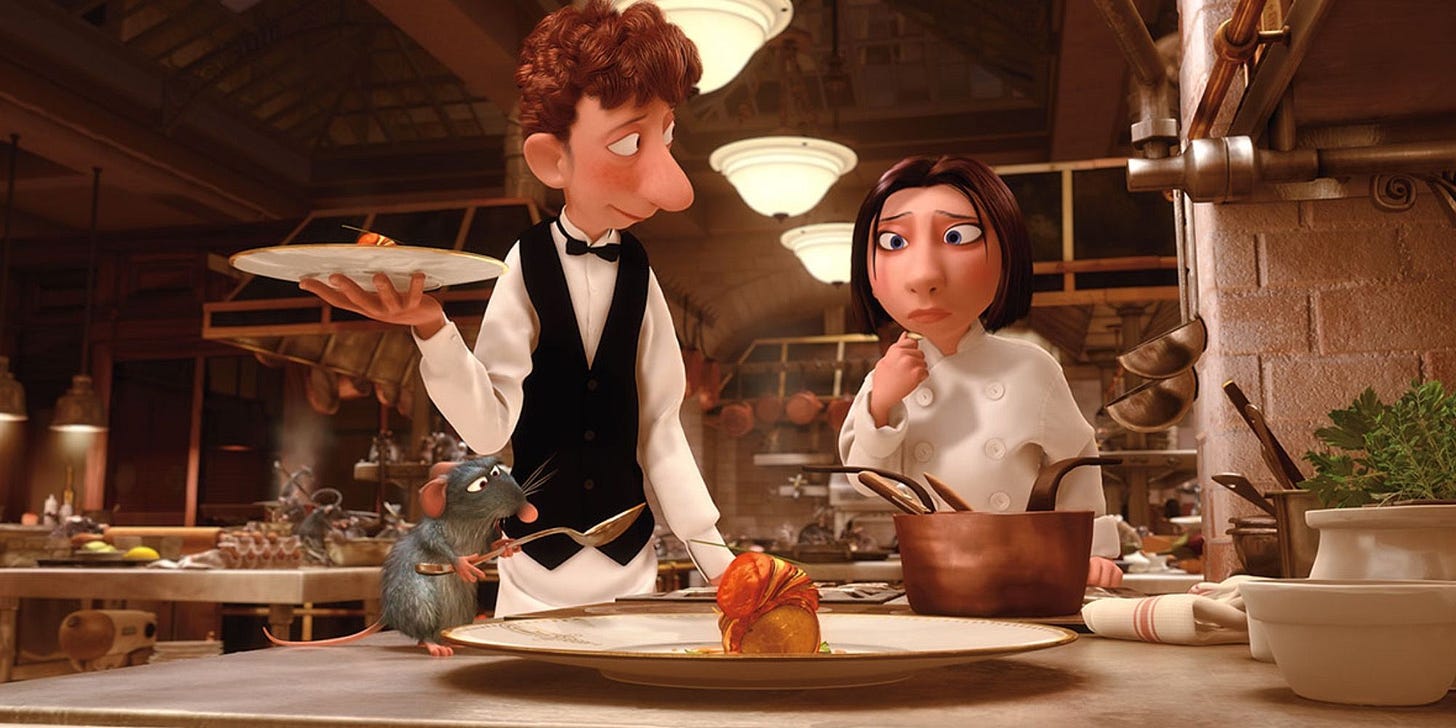Can We Accept an AI Chef?
Why we love making recipes with AI but not receiving them.
The Intelligent Friend - The newsletter about AI's psychological, social, and relational aspects, based only on scientific papers.
Intro
In today's issue, we are going into a domain that is quite (I would say totally!) different from the one I usually explore: the kitchen! No, don't worry, I won't talk to you about how to cook (even though I am specializing in many innovative and traditional Italian first courses!) but the reason is good: we are going to explore a very common and particular use of chatbots: the creation of recipes. Especially due to the specificity of requests, constraints, and tastes, many consumers are relying on ChatGPT and the like to create recipes and dishes with what they have available, or personalized weekly diets (with important implications for health and brands). However, what we are going to delve into today in a study that I found almost by chance and that caught my attention is how people judge these recipes. That is, given the same recipes, will you judge objectively or will you say that AI did a worse job?
The paper in a nutshell 🔦
Title: Would you trust an AI chef? Examining what people think when AI becomes creative with food. Authors: Califano et al. Year: 2024. Journal: International Journal of Gastronomy and Food Science.
Main result: producers who are helped by algorithms tend to receive more credit compared to those assisted by humans.
Your personal chef is ChatGPT
You're standing in your kitchen, preparing a romantic dinner for your partner. You carefully select a plump, ripe tomato and slice it with precision. The scent of fresh basil (an ingredient I love!) wafts through the air as you crush the leaves between your fingers, releasing their fragrant aroma. The main course, an ‘innovative’ lasagna, slowly bakes in the oven, its cheese bubbling and crust browning to perfection.
As you set the table, complete with a bouquet of freshly picked flowers. Your partner arrives, captivated by the tantalizing aromas that envelop the room. She or he takes a bite, their eyes widening in delight. But here’s the twist: this entire culinary masterpiece, from the intricate blend of spices to the perfectly executed steps, was crafted with the guidance of an AI recipe generator. How will your partner feel knowing that this exquisite meal was not the product of your culinary prowess but the creation of artificial intelligence? Will she/he be furious or will appreciate the effort?
Kitchen, recipes, and AI
This example makes a powerful and practical idea exactly: cooking is also creativity, and AI can have a concrete impact in this case too. If your partner appreciates your effort, it is also the result of what you have chosen as the 'mind' of the recipe: a book by Julia Child, your grandmother, or a virtual assistant. The topic of AI in the kitchen is intriguing because, as reported by studies, artificial intelligence has some characteristics that can make it a valid assistant even in the kitchen. Above all, AI is flexible. People can create personalized recipes based on needs and availability. Tools like Smart Cuisine, as reported in today's paper, allow you to create "AI-generated recipes using whatever ingredients they happen to have at hand".
Of course, as well as the potential benefits, the concerns are serious and relevant. When we talk about food, we talk about health and potential non-negligible problems. Not surprisingly, on DishGen, a leading AI recipe generator, all recipes include disclaimers stating that the company "has not verified it for accuracy or safety" and advising users to exercise their own "best judgment when making AI-generated dishes". But what is mostly leveraged is AI's ability to be 'convenient' for users and make them feel like chefs.
But while people might enjoy feeling like Gordon Ramsey, there is also an issue of other people's judgment. To what extent do people trust AI for its instructions in making food or drinks, especially when the recipes happen to be innovative? Will people prefer the good old recipe book?
Research indicates that people tend to view AI-generated recipes with skepticism, particularly when they carry the label “AI-generated”1. This perception is deeply rooted in the belief that human chefs bring something inherently valuable to the table—a sense of tradition, creativity, and reliability that machines are yet to replicate.
Today’s study explored precisely participants’ trust and perceptions of AI-generated versus human-created recipes. Participants were randomly assigned to evaluate recipes labeled as either sourced from a cookbook or generated by AI. Two types of recipes, traditional and innovative, were included for comparison. To simplify: if the dish reflects the canons of culinary tradition, it will be traditional, otherwise innovative. Take the case of Italian lasagna. If you include ingredients that are not traditionally present (for example any type of fish) it will be included in the concept of an innovative dish.
The study revealed intriguing insights into how people perceive and trust AI-generated recipes compared to those created by human chefs, focusing primarily on participants' evaluations of traditional versus innovative recipes, specifically a Negroni cocktail and a lasagna Bolognese, each presented in both classic and modern variants.
Your palate is not so precise
Results are very interesting: when it came to traditional recipes, such as the classic Negroni and lasagna Bolognese, participants showed similar levels of trust in both AI-generated and human-sourced instructions. This suggests that for familiar, well-established dishes, AI can replicate the trust typically reserved for human chefs.
The straightforward nature of the recipes and their recognizable ingredients may have contributed to this parity, as participants likely felt comfortable with dishes they already knew well. However, the scenario changed dramatically with innovative recipes like the white Negroni and tomato-jam bacon lasagna.
Participants reported significantly lower trust in the AI-generated versions of these recipes. The novelty and creativity inherent in these dishes seemed to challenge participants’ confidence in AI's culinary expertise.
The study also explored how labeling a recipe as AI-generated impacted the anticipated pleasantness of taste and aroma, as well as participants' willingness to try the recipes. It was found that participants anticipated less enjoyment from AI-labeled recipes, associating them with lower sensory appeal. This perception was particularly pronounced in innovative recipes, where the expectation of human creativity plays a more significant role in how people perceive culinary outcomes.
Finally, and interestingly, while participants acknowledged the utility of AI in providing quick, flexible recipe solutions, they expressed a preference for human-generated recipes when it came to dishes involving complex flavor profiles or new ingredient combinations. This preference suggests a perceived gap in AI’s ability to match the nuanced artistry of experienced chefs.
Before moving on to the research questions, I remind you that you can subscribe to Nucleus, the exclusive weekly section in which I send 4 paper summaries, links to resources and interesting readings, and interview the authors. It comes out every Wednesday.
In this (open to everyone), for example, we talked about the political opinions of ChatGPT, a new environment for human-robot interactions, and interesting links such as the similarity between “the child you” and the “current you”.
Takeaways 📮
AI Chef? Only for traditional dishes! Participants trusted AI-generated traditional recipes, like classic Negroni and lasagna Bolognese, just as much as those from human chefs due to their familiarity and straightforward nature.
Skepticism towards AI innovation. Innovative recipes such as the white Negroni and tomato-jam bacon lasagna saw lower trust when generated by AI, as participants doubted AI’s ability to replicate human creativity and intuition.
Is this recipe AI-generated?! Recipes labeled as AI-generated were perceived as less enjoyable, especially innovative ones, reflecting a preference for human involvement in creating complex flavor profiles.
Thank you for reading this issue of The Intelligent Friend and/or for subscribing. The relationships between humans and AI are a crucial topic and I am glad to be able to talk about it having you as a reader.
Has a friend of yours sent you this newsletter or are you not subscribed yet? You can subscribe here.
Surprise someone who deserves a gift or who you think would be interested in this newsletter. Share this post with your friend or colleague.
P.S. If you haven't already done so, in this questionnaire you can tell me a little about yourself and the wonderful things you do!
Califano, G., & Spence, C. (2024). Assessing the visual appeal of real/AI-generated food images. Food Quality and Preference, 116, 105149.








I haven’t tried that yet. But will do!
I love cooking and I have used AI to help create a weekly menu for daily life based on a structured prompt it was quite useful, saved me a lot of time!